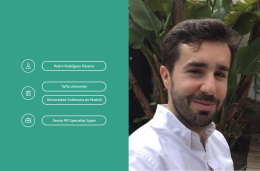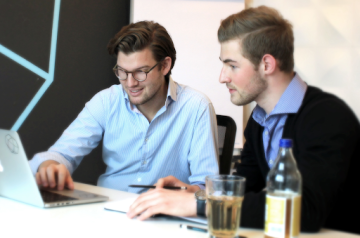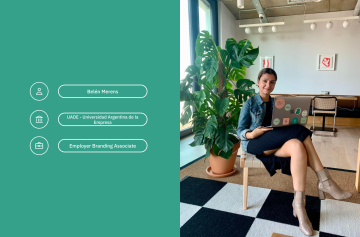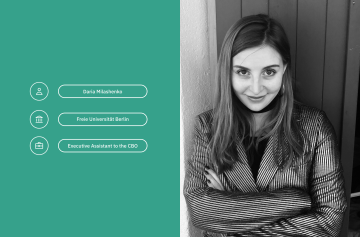
Team Spotlight: N26 PR Specialist Pedro Rodriguez Páramo on how his studies led him to a career in public relations
7 min read
Like many young boys, Pedro Rodriguez Páramo dreamed of being a football player growing up. But then, while moving across the globe with his parents, he developed an interest in politics and communications that would shape his future career. At 18, Pedro headed to the United States, where he earned a bachelor’s degree in International Relations from Tufts University, followed by a master’s in journalism at the Universidad Autónoma de Madrid. He went on to work in international communications, eventually becoming the PR specialist for the Spanish markets for N26. We sat down with Pedro to learn about his diverse experiences, and why he loves his job at N26. This interview has been condensed and edited for clarity. Tell us a little about yourself. Where did you grow up?I’m originally from Madrid, but when I turned six, things got a little more complicated. My parents worked as expats most of their lives, so I spent a lot of my childhood living abroad. When I was six, we moved to Domascus, in Syria. From there, we went to Colombia, then to Egypt, then to Venezuela, then to Argentina. When I was 15, we came back to Spain, which is where I finished high school. It was difficult sometimes because every few years we’d have to leave and start over again—but, overall, it was a lot of fun. Growing up in such an international background must have had a big impact on you. How did that influence your choice of where to study? Because I had spent most of my life in international or American schools, I really wanted to go to school in the United States. I decided to go to Tufts University in Boston and study International Relations, because I loved international politics and political science. After I graduated, I felt that I had to make a choice about what direction my life would take. It was then that I decided that I needed to go back to Spain and really plant my roots there. But sometimes that transition from college to work can be tough, so when I went back to Madrid, I felt a bit lost. But I always loved writing and reading—there were always lots of newspapers and books from my parents growing up. So I decided to pursue journalism. First I did an internship at a small regional newspaper, and I loved the experience—so I then went on to do a Masters in journalism in Spain at Universidad Autónoma de Madrid. Can you talk about some experiences from this time that really stuck with you? I mean, you were overseas, far away from your parents for the first time.Personally, it was a big awakening. I come from a traditional Spanish household—I’d never done my laundry or cooked for myself. Suddenly, I flew over to the US with just two suitcases and found myself having to take care of everything on my own. It was really my first step toward becoming an adult.The other thing that I remember is being exposed to a lot of different ways of thinking—it was like a whole new world opened up to me. For example, my girlfriend freshman year of college was part of the Tufts feminist alliance—these were not topics that were talked about in my home or schools growing up. It made me realize that there’s a lot of things to learn out there. Did you see a strong contrast between the university experience in Spain and in the States?Yeah, definitely. I feel like, in Europe, we tiptoe around everything, and in the US, they’re more direct. I like that. The educational experience in the States was also more structured, while in Spain it was less formal. Another thing I noticed is that in the US, people are very driven. One friend, for example, told me that he was going to study pre-med and then become a doctor. And then he did just that. By contrast, when I was 18, I had no idea what I was going to do with my life. Can you talk a little bit about your career path following your master’s and how you ended up at N26? After my masters, I worked at EL País—one of the top general interest newspapers here in Spain. But I’ll be honest—the life of a journalist is tough. Plus, we’re talking about 2008 and 2009, a time of real crises and instability. So I decided to pivot and go into corporate communications, and joined a PR agency. I spent 10 years doing this kind of work, and that’s where most of my career developed. After a while, it got to the point where I wanted to do something else, and I was contacted by N26 for the position of PR specialist for Spain, which is the role I’ve been in for the past year. And I love it! The Spanish team is amazing. I also get to have a lot of contact with the global PR team, which is really fun.What’s a typical day like in your current role?Basically, I take care of all the communications and PR tasks for the Spanish market. This means that I talk to a lot of journalists pitching stories, but I also have a lot of contact with everyone in the team—from People to Strategy and Operations, and so on. If I find a story that’s interesting, then I may pitch it to a journalist, or I see if we can build a story around it for a larger PR project. But I also work a lot with the global PR team, taking topics or studies that they’re working on, localizing them, and finding opportunities to talk about or present them here in Spain. What do you like most about your job here?For one thing, it’s never the same—which I love. I really enjoy having a job where I get to talk to people from both inside and outside the company—I get to learn a lot about everything that’s going on, and have a helicopter view of things. I also have a lot of autonomy. When it comes to the Spanish PR team, I’m both the intern and the CEO. So luckily there’s not a lot of micromanagement—if I make the call, then, for the most part, it goes. And that’s very valuable, to have that trust from the company that you know what’s best for your market. How do you apply the skills you learned in your degrees to your current role? For starters, learning how to operate in an international environment has served me well, because N26 is such an international company. And one thing I’m good at is relating to other people—not only from different backgrounds, but from different specialities and teams. That’s a personality trait, but it’s also something I cultivated in school. In my master’s degree in Spain, I learned to write for different audiences, such as newspapers and online outlets, which has been very valuable in all aspects of my career. Looking back, what life lessons did you take from your time in college? I would say the most important lesson I learned is to take ownership. Learning to be autonomous, to study, and to be on your own is so important. Also, in college you get a lot of freedom, and you’ve got to be smart about that—to make sure you’re being responsible. Take ownership, but embrace your autonomy. Maybe you don’t realize it right away, but everything you do does have an influence on your career trajectory. What are your goals going forward? I definitely want to keep growing in the PR role in Spain, but I’m also involved in developing a new ESG (environmental, social, and governance) strategy at N26—which is something I care a lot about both personally and professionally. That’s what’s so great about a younger company—you get to be involved in building things from the ground up. It’s an exciting time, and I’m really happy to be here.
Find similar stories
BY N26Love your bank
Related Post
These might also interest youINSIDEN26Reflecting on 9 years at N26N26 Chief Growth Officer reflects on his 9-year journey at Europe’s leading digital bank
10 min read
INSIDEN26Employer Branding Associate Bel Merens on uni, travel, and living your dreamsTeam spotlight: Bel shares how she made her dream—moving to Europe to work for a popular FinTech—a reality.
9 min read
INSIDEN26Team spotlight: Daria Milashenko, Executive Assistant to the CBOWhen Daria Milashenko, Executive Assistant to the CBO at N26, visited Berlin at 15, it was love at first sight.
9 min read


